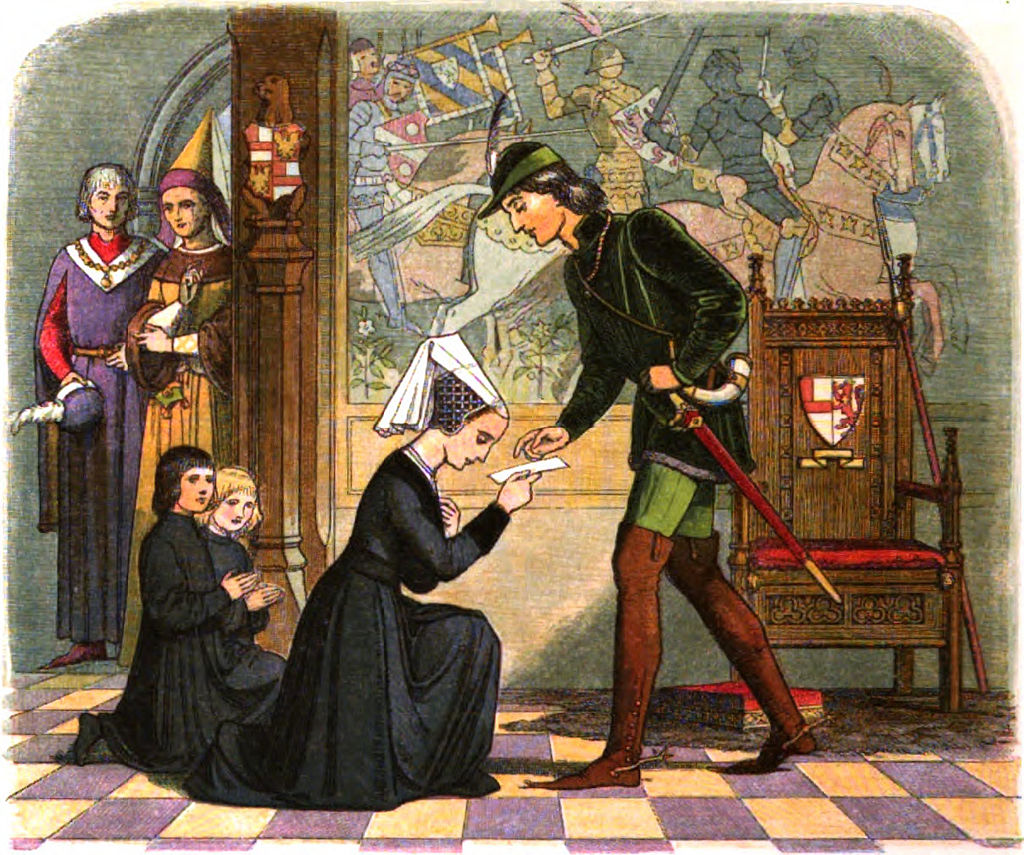In the next in our series on the Wars of the Roses, this article looks at the importance of the Earl of Warwick, the kingmaker. It follows our introduction to the Wars of the Roses available here, our article on Edward III’s descendants and the causes of the Wars of the Roses available here, and the battles of the war from 1455-1464.
The Earl of Warwick was a great and noble man who understood the battlefield, understood soldiers, and understood men. Unfortunately Warwick did not understand women. And the fact that he did not understand women was, indirectly, the reason for his downfall and death.

Edward IV meets his future wife and Queen, Elizabeth Woodville (Elizabeth Grey)
Through blood and marriage, Richard Neville – the 16th Earl of Warwick, also known as ‘The King Maker’ – had inherited nearly all the lands in the north of England. This made him one of the richest men in the kingdom, richer even than the King. The Earl was a fair and much loved landlord, meaning his tenants would quickly and happily take up arms for him, something the King could not boast. Common sense would dictate that a wise King would keep the Earl as a close companion and heed what he had to say, but Edward IV was young and silly and more concerned with filling his bed than commanding his kingdom. All foreign and domestic powers knew that Warwick ruled England while the King bedded the women of England. Warwick liked it that way. If he could not be the King, he would rule through him instead.
In the middle ages, a King’s marriage was a very important contract between two kingdoms. Warwick made it his business to unite England and France to dispel any chance of a repeat of the Hundred Years War. England was bankrupt and the country was still healing from war with France and war within its own borders. It was reasoned that an alliance with the French would help to fill English pockets and heal the wounds of war. Warwick worked tirelessly to convince the French King that the silly English King was worthy of a French princess. It took months of planning and bargaining before Warwick could finally announce the fruits of his labour – only to have Edward stand up to announce that not only was he already married, but had been for four months and to a widowed commoner whose family had fought against Edward’s army. We’ll never know Warwick’s real thoughts, but after suffering this verbal slap in the face, one can assume he was not impressed. Edward’s new Queen – Elizabeth Woodville – was not someone to be taken lightly. The medieval Queens were always strong, powerful women – they had to be – but no medieval man would ever admit it. Their religious beliefs and male ego prevented them from seeing women as anything but baby-making property. And so, with blinkered eyes, they accepted their new Queen with no thought to her hidden agenda.
But hidden agenda she had. Within months, Elizabeth’s twelve brothers and sisters were married into powerful and rich families. Positions reserved for the men who had fought to put Edward on the throne were suddenly handed to commoners who had fought to keep Edward from the throne. Wealthy ladies were married off to men they would have hired to clean the stables. The King’s government now consisted of his father and brother-in-laws. Suddenly it was all too clear who ruled England and it wasn’t the silly young King or the powerful Earl of Warwick – it was the widowed commoner who somehow got a King to marry her and hand over the reins.
Warwick sat and watched this game from his lands in the north. He quietly watched the government be over-thrown by power hungry commoners. He silently watched as the King he had fought for, lost a father and brother for, risked his life for, grew fat and lazy, controlled by his Queen and her rabbit-brood family. But it was Edward’s refusal to accept a marriage contract between Warwick’s daughters and the King’s brothers that finally pushed The King Maker over the edge. The man who had put Edward on the throne now set out to destroy him.
By M.L King, a history enthusiast and part-time blogger.
The next article in The Wars of the Roses series is about the treachery of Prince George and the Kingmaker’s downfall – available here.
Join the debate and hear about the next in the series! JOIN US and we’ll keep you updated! Click here.
References
- The Wars of the Roses by Robin Neillands (published by Cassell)
- British History by Miles Kelly (published by Miles Kelly Publishing)
- Who’s Who in British History (published by Collins and Brown Ltd)
